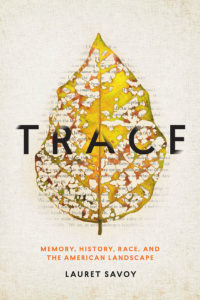Trace

Sand and stone are Earth’s fragmented memory. Each of us, too, is a landscape inscribed by memory and loss. One life-defining lesson Lauret Savoy learned as a young girl was this: the American land did not hate. As an educator and Earth historian, she has tracked the continent’s past from the relics of deep time; but the paths of ancestors toward her—paths of free and enslaved Africans, colonists from Europe, and peoples indigenous to this land—lie largely eroded and lost.
In this provocative mosaic of personal journeys and historical inquiry across a continent and time, Lauret Savoy explores how the country’s still unfolding history, and ideas of “race,” have marked her and the land. From twisted terrain within the San Andreas Fault zone to a South Carolina plantation, from national parks to burial grounds, from “Indian Territory” and the U.S.-Mexico Border to the U.S. capital, Trace grapples with a searing national history to reveal the often unvoiced presence of the past.
Attentive to the rhythms of language and landscapes, Lauret weaves together human stories of migration, silence, and displacement, as epic as the continent they survey, with uplifted mountains, braided streams, and eroded canyons. Trace delves through fragmented histories—natural, personal, cultural—to find shadowy outlines of other stories of place in America.
Every landscape is an accumulation, reads one epigraph. Life must be lived amidst that which was made before. Lauret Savoy lives there, making sense of this land and its troubled past, reconciling what it means to inhabit terrains of memory—and to be one. Though deeply personal, Trace concerns who we all are in this terrain called the United States, inviting readers to have a more honest understanding of history’s impact in our lives.
The Mesa Refuge
Point Reyes Station, CA 94956
